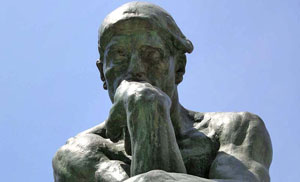Shapiro over ethiek en wetenschap

One of your current interests has become the ethicalproblems raised by biomedical research. How did you get involved inthat discourse?
I got interested and involved in bioethics in a serious way inlate 1995, when President Clinton asked me to chair the NationalBioethics Advisory Commission. I had not spent a lot of time inthis area. Bioethics is not my area of specialty at all.
But I did spend five to six years as head of that commission, witha wonderful and generous group of commissioners, most of whom hadspent their lives working on bioethical issues. It was a tremendouseducational experience, and I got captivated by this particularapplication of moral philosophy.
I have always been interested in applying the tools of moralphilosophy to actual issues that people have to confront in theirday-to-day lives, and the nation has to confront in the formationof public policy, particularly where there are ethically contestedissues.
Liberal democracy is where we value cultural pluralism; you’rebound to have disagreements on ethical issues. The question is, howdo you resolve them? It’s been a general area of interest of mine.This opportunity to head this commission enabled me to think morecarefully about this issue and the biomedical arena. I headed thatcommission about six years, and the past three years I have beenteaching in that area. So that’s how I got into it.
What surprised you most in the deliberations of thecommission?
What surprised me most was the public response to a number ofdevelopments in the biomedical frontier. That is, people respondedwith great consternation, and sometimes fear, in areas likecloning, or reproductive cloning, especially; or the controversythat surrounded embryonic stem cell research.
I was initially unclear what people were so excited about, and so agood deal of my own work in the last few years has been focused onthat issue. What is it that gets people so uncertain in this area?What is it that’s bothering them? It’s been an interesting journey,and I’ve learned a lot in that area since then.
And what was bothering them?
What’s bothering them is that the most basic of all humancharacteristics, in my judgment, is that society has developednarratives, stories which gives transcendental meaning to their ownefforts. After all, an individual seems to be meaningless in thishuge world of many individuals and forces beyond their control. Whydo we all work so hard? Why do we sacrifice so much? Because wethink we’re part of a larger story that’s evolving.
These narratives are developed over years. They may be revealednarratives, or they may be constructed narratives. They arecritical to people’s lives. I know many societies exhibit no[scientific] curiosity whatsoever. I don’t know of any that don’thave these narratives that support their joint efforts andsacrifices. Therefore, new developments in scientific frontierssometimes upset these narratives. A number of dramatic historicalexamples: Copernicus finding out that we weren’t the center of theuniverse, or Darwin finding out that we’re just part of a vastevolutionary scheme, we’re not so unique after all, and soon.
These upset narratives, and people suffer a psychic loss when theybecome estranged from a narrative they’ve been committed to,because the truth claims are no longer possible to uphold — thatthe planet Earth is the center of the universe, for example, orthat human beings are completely unique. (We may be unique incertain dimensions, but we share a common genetic code with allliving organisms.)
So these narratives get upset, and therefore we have to understandwhat it is that’s upsetting people and help them resolve it anddevelop new narratives. You also, of course, have this enormousinfluence of science fiction, where science is always getting intoevil hands, and that’s very upsetting to people. These newdiscoveries remind people about that. I think these are socialissues which can be resolved and worked on, but only if werecognize them.
How do you think this anxiety affects the political process,and with what consequences for the university?
It can have very important effects on the political process.For example, the federal government is a main supporter ofbiomedical research on most of the university campuses, and if itdecides that it will not finance any work in therapeutic cloning orhuman embryonic stem cell research, this will cut off manyopportunities for scientists who are working at universities. Soscience policy becomes an important thing.
Has there been a failure of politics to deal with these issues,and if so, why?
I think there has been a failure of politics to deal with a lot ofthese issues. One of the key reasons is that thepro-life/pro-choice debate has been about the most polarizing moraldebate in our country. On the political scene, it’s absolutelypolarizing it.
Anything that impacts on that has implications like that and isvery controversial. It’s controversial in many countries. But weseem less able than most to come to some workable compromise thatpeople can live with.
How does this define, possibly, a new program for universitiesin educating students to think about these issues? Or haveuniversities been doing a good job of that?
I don’t think universities have been doing a good job,although they’re doing a better job now than before. The time thatstudents spend on the university campus, typically between the agesof 18 and 23 or 24, is a time of tremendous moral development, andthe university ought to take on, self-consciously, the [question]of in what way can the university experience assist the moraldevelopment of their students or participate in the moraldevelopment of their students.
It’s everything, from the kind of moral leadership I talked aboutbefore — the university explaining why they act the way they doand whose interests they are serving — to how the curriculum isorganized. If you’re teaching courses where ethical issues come up,whether it’s in science or in social science or the humanities, toexplore these and to have students practice it, and deal with moralproblems and make difficult moral calculations, and understand thatthere’s an immense amount of anguish when you’re trying to build abetter world, because it’s uncertain just where you’re heading. Ithink we could be much more effective than we are in helping ourstudents in their moral development during those years.
You’re also suggesting that the scientific community itself hasto think about engaging in this dialogue, not in a way thatthreatens their integrity as scientists, but with a greater empathyfor the views of those people who focus on the breakdown of thenarrative.
The scientific community must be involved in seriousconversations with the non-scientific community. By serious, I meanconversations where both sides might change their minds onsomething. They might not, but at least they allow for the factthat they might.
It’s incredibly important that scientists participate, because theyunderstand the science in the way that the rest of the citizens donot. You don’t want any moral misunderstanding to arise justbecause you misunderstand what the science is all about. Soscientists, by virtue of expertise, have a special need and aspecial responsibility to participate in these discussions.
You write, “The best of these conversations will includeindividuals of courage able to sustain a perspective, empathy tothe interest of others’ perspective, a capacity to identify the keyissues, and the humility necessary to recognize when their mutualviews need modification.”
Yes, that’s exactly what I mean when I talk about seriousconversations. You both might exit the conversation thinkingdifferently than when you went in. That would be good evidence thatyou picked up some empathy for an alternative point of view andmodified your own perspective on the issue. Not to give up onthings that you believe in but to understand that we all have tolive together in a single, moral community and that might involve,from time to time, some compromise.
[U leest het volledige vraaggesprek uit de reeks ‘Conversationswith History’van het Institute of International Studies, UCBerkeley
Meest Gelezen
Wederom intimidatie van journalisten door universiteit, nu in Delft
‘Burgerschapsonderwijs moet ook verplicht worden in hbo en wo’
Raad van State: laat taaltoets nog niet gelden voor hbo-opleidingen
Vrouwen houden universiteit draaiende, maar krijgen daarvoor geen waardering
Extra geld voor bètafaculteiten is daar nooit terechtgekomen



